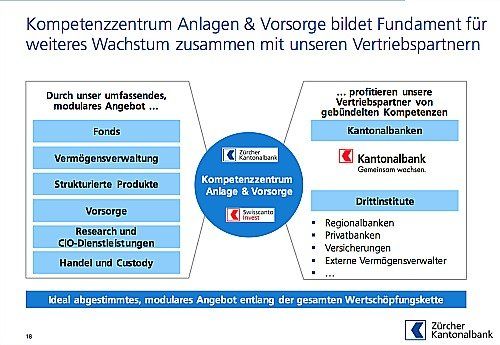After the conclusion of the sale of Swisscanto, which designed investment vehicles on behalf of all Swiss cantonal banks, they now turn to producing and selling their own funds to recover the lost revenue.
It's as if a City banker moved from London to a bank in Manchester: Alex Tobler (pictured below), an investment expert working on the shores of Lake Zurich last year decided to move to Bern, joining the asset management unit of Berner Kantonalbank (BEKB).
Tobler's brief in the capital of Switzerland: to design a portfolio of five new strategy funds to be sold to the clients of BEKB. «Since its launch, the funds attracted 350 million Swiss francs in new money,» he proudly told finews.ch.

ZKB Counterattack
The Bernese experience is only one of many. A string of cantonal banks have launched new funds. The reasons may vary but it is evident from the timing that the wave of new products started when Swisscanto was sold to Zuercher Kantonalbank (ZKB) at the end of 2014, even if the banks deny the link. Swisscanto was – and remains – the main source of funds and investment know-how of Swiss cantonal bank.
Unsurprisingly, Swisscanto is struggling to attract new money. Riled by this development, ZKB has has gone on the counterattack – and reaped the first benefits of this strategy.
The first cantonal banks – institutes that used to or still belong to the governments of Switzerland second-tier political level, the cantons – to start selling their own new funds were the bigger institutes from Bern and Basel as well as the one from Schwyz. They've since been joined by Walliser Kantonalbank. The bank from Zug already in 2014 put a series of strategy funds on the market, containing passive investment elements.
The chief executive of St. Galler Kantonalbank on Wednesday said he was mulling launching his own funds.
No More Kickbacks
Having sold their Swisscanto daughter, cantonal banks don't receive any dividends or marketing fees anymore – which will have an immediate effect on their annual results. «This will need to be compensated for somehow,» said Roland Ledergerber, CEO at St. Galler Kantonalbank.
The advantage of own products are straightforward: banks can use the funds for diverse purposes, including wealth-management mandates and pension funds; the strategy of the funds are always in line with the bank's own and of course, last but not least, the bank doesn't have to share the profit.
The banks also claim that going it alone is cheaper than buying the finished product. Of course, the development of a fund costs money, but the administration in-house keeps the costs down, Tobler says. And in times of low interest rates, keeping administration costs low is definitely an important factor.
But the main reason, why banks have started to push the development of their own products is the end of kickbacks. Having lost that rich source of revenue, banks now how to charge advising fees and the sale of third-party products is far less attractive.
Competence Center for Asset Allocation
ZKB, the owner of Swisscanto, will have to tackle the issue soon as new funds are mushrooming. Last year, the funds of Swisscanto managed to attract some new money still, but ZKB will have to become much more active in the defence of its market share. To that purpose, ZKB has repositioned itself as a competence center for asset allocation.

«We are supporting the cantonal banks, where they need our services,» ZKB said. «We define our marketing instruments to that purpose.»
ZKB has already been able to reap the benefits of its change of tack. Thurgauer Kantonalbank on Thursday said it will cooperate with the colleagues from Zurich in asset allocation. The institute decided not to renew the contract with Wellershoff & Partners, the company founded by Klaus Wellershoff, a former UBS chief economist. Wellershoff incidentally is also mandated with the investment strategy of Zuger Kantonalbank.




































